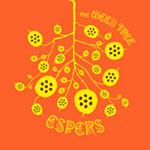Musings on music delivered when I dig myself out.
 Espers -- The Weed Tree
Espers -- The Weed TreeLocust Music; 2005
Folk music is a genre that often gets the shaft from casual music listeners these days. As the genre that's existed since the dawn of music and one that was immensely popular in the 50s and 60s, it's hard to believe how few people care about it today. Besides Bob Dylan, most folk musicians are ignored so completely that their existence is more associated with Nouveaux-hippy girls who love patchouli than the enormous culture of tradition yet envelope-pushing they belong to. If listeners can’t be bothered to explore the roots of the genre, Espers is a band that serves as invitation to today's take on folk.
Like archaeologists marveling at every speck of dust in a musty tomb, the members of Espers have taken great care to examine their roots. Espers churn out evocative and lush folk tunes that draw heavily from the vast careers of The Fairport Convention, Pentangle and The Incredible String Band. They also have a tendency to meander through psychedelic pastures, casting a hazy, mellow veil on their work. Their self-titled debut dropped early last year to quiet critical acclaim. Now a year and a half later, Espers gives listeners The Weed Tree: a seven song collection of covers and one original.
Word choice-enduced giggles aside, The Weed Tree further displays the high regard in which Espers holds its influences. Album-opener "Rosemary Lane" and "Black Is the Color" are traditional folk songs that are immediately familiar to the ear, even if they’ve never been actually heard before. The group also takes on the diverse crowd of Blue Oyster Cult's "Flaming Telepaths," Durutti Column’s "Tomorrow," Nico's "Afraid" and psych-folk legend Michael Hurley's "Blue Mountain." Performing covers is as precarious as is it is liberating. Without a blend of reverence, ability and one's own creative flourishes, covers tend to end up as filler for groups that are otherwise stumped. The Weed Tree comes off more as a thank-you card to the past for having preceded them.
The album starts with thoughtful strumming of the main theme of "Rosemary Lane," melancholic and crystal clear like haunting memories. Meg Baird and Brooke Sietinsons sing each line stoically -- as if it were lifted from their family history – their harmonies precisely leaping over and over each other. "Black Is the Color" is likewise bittersweet, adorned with deeply sorrowful cello lines, stately boy/girl harmonies and chimes -- lots of chimes. Espers's faithful treatment of the profoundly tear-jerking "Afraid" is pleasant, but fails because no one can intone the emotions of helpless love quite like Nico (not a strike against them). The selection of "Flaming Telepaths" by B.O.C. is an interesting choice, mostly because Espers isn't a junkie metal band. And yet, the trio molds "Flaming..." into their own creation by letting their freak-flag fly. Needle-thin guitar lines dance over industrial buzz synth lines and lazy drum patterns in the first half of the tune, then take a backseat to searing guitar solos and organ wails in the second. This creative elasticity is surprising and entirely welcome.
Even though Espers only contributes one song of its own, it's a bold reassurance that the group hasn't been sitting on their hands creatively. "The Dead King" is a mournful funeral march, complete with howling violin and synthesizer arrangements, and subtly-affected vocal melodies. As the musical procession fades, the desire for more original material arises. The group's careful and dazzling versions of other people's work as well as their own prophesizes a bright, if somber, future for Espers. The trio makes great use of a genre that popular culture has all but maligned through disinterest. Now that they've done the homework for the listeners, it's our turn to pay rapt attention.
I Got Love For
-
The Absurdist
Blogebrity
Catchdubs
Chicagoist
Coolfer
Choire Sicha
Design*Sponge
Falter.net
Fail
Gawker
Gideon's Bible
GoldenFiddle
I Love Music Messageboard
Lemon Red
Light Blue Extra
Low Culture
Mostly Meat
The Minor Fall, The Major Lift
Powerhouse
Quarlo
Razorblade Runner
Riff Raff
Razorblade Runner
Sploid
Stereogum
The Tofu Hut
Weekend Ink
ATOM 0.3
Establish Contact:
Previous posts
- What do I look like, a Burger King?
- Smushed slowly from the side
- Razor blades, gabba gabba hey
- Franz Ferdinand -- You Could Have It So Much Bette...
- The Click Five -- Greetings From Imrie HouseLava/A...
- Black Rebel Motorcycle Club -- HowlRCA; 2005 I...
- Young Jeezy -- Let's Get It: Thug Motivation 101De...
- And now I'm all wit' it OR Amerie "One Thing (Siik...
- Fischerspooner -- OdysseyCapitol; 2005Fischerspoon...
- High on Fire -- Blessed Black WingsRelapse; 2005It...
Archives
- 11/01/2003 - 12/01/2003
- 12/01/2003 - 01/01/2004
- 01/01/2004 - 02/01/2004
- 02/01/2004 - 03/01/2004
- 03/01/2004 - 04/01/2004
- 04/01/2004 - 05/01/2004
- 05/01/2004 - 06/01/2004
- 06/01/2004 - 07/01/2004
- 08/01/2004 - 09/01/2004
- 09/01/2004 - 10/01/2004
- 10/01/2004 - 11/01/2004
- 11/01/2004 - 12/01/2004
- 12/01/2004 - 01/01/2005
- 01/01/2005 - 02/01/2005
- 02/01/2005 - 03/01/2005
- 05/01/2005 - 06/01/2005
- 07/01/2005 - 08/01/2005
- 09/01/2005 - 10/01/2005
- 10/01/2005 - 11/01/2005
- 11/01/2005 - 12/01/2005
- 01/01/2006 - 02/01/2006
- 03/01/2006 - 04/01/2006
- 05/01/2006 - 06/01/2006
- 06/01/2006 - 07/01/2006
- 10/01/2006 - 11/01/2006

0 Responses to “”
Leave a Reply